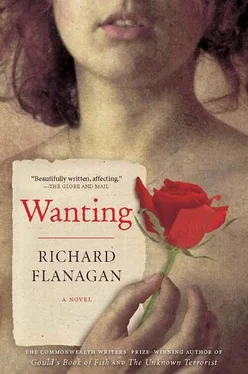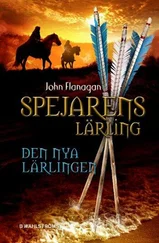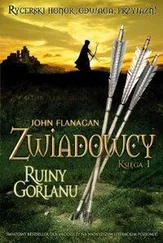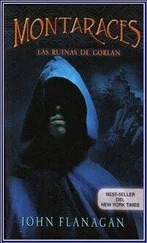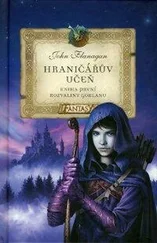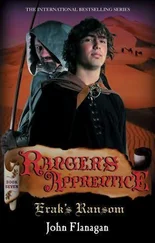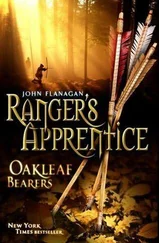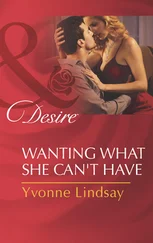‘Nine-tenths of what we are, Mr Lazaretto, good or evil, useful or useless, comes, does it not, you would agree, from our education?’
Francis Lazaretto, who had produced a forged letter from the Master of Magdalen College proving conclusively he had passed two years at Oxford reflecting on the classics, had instead known education for only four years as limited rote-learning and almost limitless violence in a Yorkshire boarding school of dubious intent. In consequence, he understood his own achievements as very much his own, and he did not agree at all. What self-made man would? But what self-made man on the make ever disagreed with a superior beyond what was necessary to establish himself as a creature of worth and independence?
‘Of course, Ma’am,’ he replied.
Feeling he had through opposition sufficiently established his bona fides, Francis Lazaretto put down both Rousseau and his own opinion, and introduced St Thomas Aquinas in support of Lady Jane’s arguments and in contradiction of his own, quoting the great ecclesiastical authority as declaring that all men are, at first, a clean tablet on which nothing is written.
‘Precisely,’ said Lady Jane, pleased to discover the immortals had also been persuaded by her convictions. ‘The distance between savagery and civilisation is measured by our control of our basest instincts. And the road travelled to civilisation is, I intend to show, enlightened education.’
Sir John was less sure about what he termed Francis Lazaretto’s ‘insinuating midshipman’s air’, but Lady Jane understood her husband’s lack of enthusiasm as the jealousy of a man untutored in these great debates.
‘On this forsaken prison-island, we have had the good fortune to find the one man who understands the gravity and necessity of our experiment,’ she told him, as a convict footman lit a fire of cow dung in the coal grate to keep at bay the mosquitos. Above all else, it was her husband’s thinning hair that annoyed her, the white wisps of which reminded her of a spider’s web—and revolted her because in them she intimated her own approaching age, and with it the vile cage in which all old women were put. Sir John kept the wisps plastered over his dome with a black pomade that on hot days left his brow criss-crossed with greasy dark streaks.
‘God could not have been kinder,’ she said coldly.
Seeing the reformation of a savage as a moment when his personal destiny—hitherto sorrowful, following his transportation after a shop-keeper swore false witness against him—might be forever after linked with that of the nobler histories of Science and Christianity, Francis Lazaretto at first approached his task with sincere industry, devising a complete syllabus of Latin, Greek and rhetoric, each day beginning and ending with a thorough study of the Scriptures. In accordance with the most modern thinking, while literacy was stressed to the utmost, frivolities such as novels were banned and a wide variety of moral grammars imported from Sydney for Mathinna’s edification.
Lady Jane was publicly delighted and privately intimidated by Francis Lazaretto’s programme, which he presented in a carefully tabulated chap book, with each left-hand page of columns accounting for another week of lessons, prayer, marks and attitude, and each right-hand page blank in order that he could record there his observations of Mathinna’s progress, for which the programme admitted no possibility of alteration, far less failure.
‘It would break me,’ said Sir John, but on seeing his wife’s thin lips purse, quickly mumbled, ‘but a child is a tabula rasa , not an old moth-eaten book.’
The room designated as the schoolroom faced the harbour and had large windows to aid reading. Yet they always seemed to draw Francis Lazaretto to look at the world outside and the brilliant sun spilling off the sea beyond. For he was given to manias, and weather seemed to set them off—hot weather leaving him euphoric and cold weather conducive only to melancholy. It had been hot when he had met the Governor and his wife, but then the weather changed and the mountain grew iron-grey with snow cloud as Lady Jane’s grand experiment finally got properly underway.
And as the sun on the water vanished, as the water turned to ruffled lead, Francis Lazaretto found he had no heart for any of it. It was, he realised, pointless. Pointless and meaningless, as he felt almost everything in his life to be.
His second week began and Francis Lazaretto wept not long after. He sat and stared at the grey cloud. The child seemed to understand when he talked to her of his pain. She understood many things, he came to realise, and he told her about his life and the women he had known, and the way all that was also meaningless and pointless. She taught him a dance, which she said was that of the echidna, along with several words of her native tongue.
In his third week of tutoring, the clouds melted and his mood improved markedly; the need to instil Latin declensions and Greek conjugations reasserted itself, but it was all too late. Mathinna had warmed to her tutor, and the tutor’s concerns seemed to have altered considerably. Lady Jane walked in one day to find them both playing with Mathinna’s parrot: they had devised a form of football in which the bird and they competed for a walnut that the bird rolled with its beak.
‘Mr Lazaretto no Mr Lazaretto at all,’ said Mathinna after the second month. ‘He Jesus Christ and he been sent among us to—’
‘He is what?’
‘He the saviour, Ma’am,’ said Mathinna, who had found Mr Lazaretto’s catechism more extraordinary and certainly more entertaining than any she had ever heard. ‘Of us all. He say others do not see it, like they do not see the snakes flying over Hobart Town of a night and the bats under our feet of a day. He say as God was unknown to me, so he unknown to the whitefellas, but this will change come next Easter, Miss.’
It transpired that Francis Lazaretto had never been a tutor, though he had once worked as a dancing master. Apart from acting, he had no aptitude for anything much beyond playing ditties on a button accordion and a certain dexterity at Aunt Sally, a game he taught Mathinna, in which they competed to knock down a set of skittles by lobbing long staves.
Lady Jane did not accept that her failure with Mathinna disproved her theories—rather it demonstrated powerfully their rightness: clearly too much had transpired by the age of seven, and what must happen was the breaking of all bonds from birth. Only in this way would change for the better be possible. What was clearly needed, she now told Sir John, was the building of a world that would shape the earliest impressions favourably—from birth children must breathe in the fresh air of civilisation, not the stinking miasma of forests.
The design for the glyptotech having arrived, Lady Jane purchased some hundreds of acres to the northwest of Hobart in Kangaroo Valley, where she intended to build her temple to the arts. It would help regenerate the empty and frivolous of the colony, she told Sir John; it would be an area conducive to the study of natural history; and it would show how art, properly understood and in its most classical expression, as represented in twenty-four plaster of Paris reproductions, could help the soul advance from primitive passion to civilised reason. In this way, Lady Jane’s plans for Mathinna’s advancement were never completely abandoned, but were used as an argument for new projects.
So it was that the child, who was unobtrusive and charming, grew up avoiding her lessons, Francis Lazaretto and she having arrived at a perfectly acceptable arrangement that saw them pass the morning together playing and left her afternoons free to do whatever she wished. Late one summer afternoon, when Sir John had gone into the Government House gardens with Montague to take some air, he looked up from a conversation about a new wharf that was not going well to see the Aboriginal girl in a red dress.
Читать дальше
